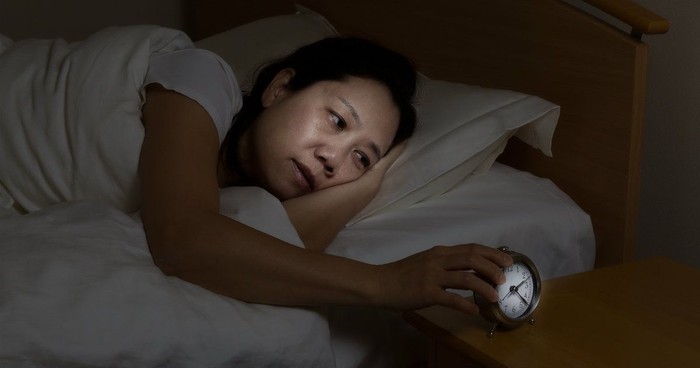
It’s never good when rum seems like the only solution.
Picture this scene five years ago: it was 1 AM, and I couldn’t sleep—again.
Back then I didn’t realize how common my sleep problem was. The American Academy of Sleep Medicine estimates that 15 to 20% of adults struggle with insomnia in the short term, while 10% have longer-lasting disorders.
Dread of the dark perched on my shoulder. In the kitchen, I sloshed a little liquor into a glass. That’s when I noticed that the liter bottle was almost empty.
My husband doesn’t drink, and I had not made any daiquiris. I’d finished the rum all by myself.
I wasn’t getting hammered—I just had what seemed occasional shot to sleep. Tylenol PM made me groggy all day; valerian gave me a headache. Alcohol seemed like a reasonable alternative.
But when I held that empty bottle, it didn’t seem reasonable at all. Suddenly, I noticed it made me feel ashamed to keep turning to drink.
Help, Jesus, I thought. I have a real problem with sleep. I don’t know what to do.
In that moment, I felt worse about my insomnia that I ever had. I was so sick of being wide awake. I was so sick of the dread that smothered me when I hit the pillow. I was so sick of the dark.
And now, I was sick of the one solution that helped me. Despite my prayer, I felt terribly alone.
Little did I know that that moment of shame would help me finally start getting the sleep I longed to have. My sleep habits changed not because I tried harder, but because I changed my attitude towards my struggle.
From Erasing a Problem to Paying Attention to It
The biggest shift that happened that night was simply admitting to myself and to God that I had a problem sleeping. It’s funny—before that night, I knew perfectly well I struggled with sleep. I just didn’t want to deal with it.
The morning after I held the empty bottle, I did something truly transformative. I googled “insomnia” for the very first time.
That’s right: I had never actually researched my problem before.
To my surprise, the very first article I found suggested a new strategy: it told me to get up rather than tossing and turning.
I decided to give it a whirl. The next sleepless night, I got up and played solitaire. When I felt tired again, I lay down—and fell asleep immediately.
It changed everything.
I could not believe how simple it was to find an alternative to alcohol. It didn’t make insomnia go away, but it made it easier to bear.
But only when I finally admitted to Jesus that I could not erase insomnia did I start actually confronting it.
From Ignoring My Body to Connecting to It
In the months that followed, I played nighttime solitaire regularly. Rather than feeling anxious, I felt present and calm. My calmness helped me notice something. On nights approaching my period, I had the most trouble sleeping.
My insomnia came fromHORMONES.
I’d always assumed that my insomnia was a character flaw. When I realized my sleep patterns had a physical origin, a huge weight of shame dropped off my shoulders.
Insomnia, oddly, connected me more to my body. As I noticed the ups and downs of my energy, I felt thankful for being God’s creation. He didn’t make me a machine, but gave me a cycle like the tide and moon. I could celebrate being human, precious, and unique.
From Shamed to Whole
Once I had a better understanding of insomnia, sleeplessness no longer bothered me much. On the nights where I lay wide awake in bed, I just got up. It was no big deal.
In other words, the story I told myself about my insomnia made all the difference.
If I told myself I was stupid for not falling asleep, I spent the entire night half-panicked and ashamed.
If I told myself my sleeplessness was normal, and that I’d get through it okay, it no longer panicked me.
Changing how I saw insomnia made it less burdensome.
From Isolated to Connected to God
Before I came to terms with my anxiety, I felt a lot of guilt about not praying in the night watches. Friends used their sleeplessness as a call to reach out to God, but to me, 1 AM prayers sounded stressful instead of restful.
But as my sleepless nights grew more bearable, I began praying almost without realizing it. If I felt upset about something, I’d talk with God as I played cards.
Little by little, I found God to be my nighttime companion without much fanfare. During some long nights where sadness kept me up, I found such unexpected sweetness from God’s presence—not because I tried harder, but simply because I needed someone to talk to.
Paying Attention Brings the Spirit
It’s funny: I spent decades being afraid of not sleeping. Now, five years later, insomnia no longer drains me. It’s just a different kind of night.
Your insomnia might be more serious than mine; more entrenched, or in need of serious medical intervention. I’m not saying that praying will “cure” insomnia. I’m saying that rather than wishing away our brains, our cycles or our pain, God asks us to allow them to teach us.
It was when I actually asked for God’s help that I became willing to actually do something about insomnia. Even if I’d needed more complicated interventions, I was finally willing to try.
When I paid attention, I found wholeness, awareness, and connection to God.
The Holy Spirit rushes in when we’re willing to actually face the life we’re living, even when it’s not what we’d choose. Our wise counselor is ready to hold up our arms as we bear burdens we wish we did not have to carry. And even if it’s not what we’d choose, God will strengthen our arms and back to shoulder the load.
Image Credit: ©Thinkstock.com/tab1962








